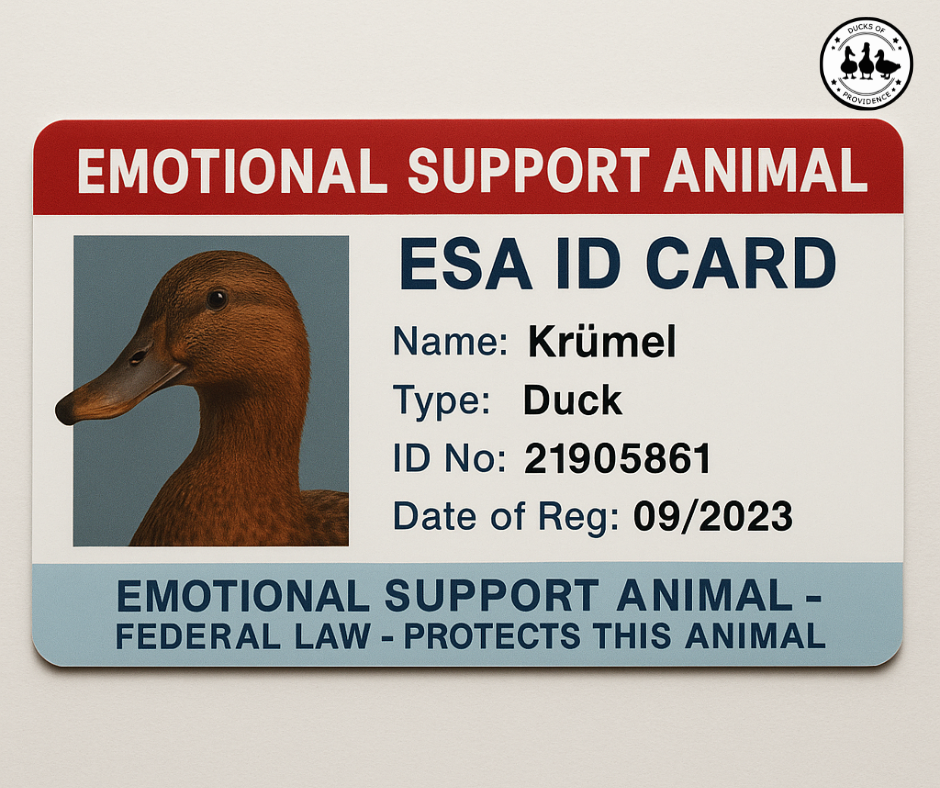
Ducks as Emotional Support Animal: What You Should Know
Last updated on January 19th, 2026 at 03:16 pm
There’s something uniquely soothing about the gentle quacks and soft feathers of a duck. For many of us, our pet ducks aren’t just backyard companions. They’re family. In my case, one of my ducks, Krümel, is officially my emotional support animal (ESA), though all seven bring me comfort and joy every single day. With her calm nature and affectionate bond with me, Krümel has supported me through some of my most stressful moments, whether in the lab, during travel, or through personal challenges.
But what does it really mean for a duck to be an emotional support animal? Can ducks legally be considered ESAs? And what should you know before considering your own duck for this role?
Let’s explore the emotional, legal, and practical sides of ducks as emotional support animals, backed by research, real-life experience, and love.
Ducks of Providence is free, thanks to reader support! Ads and affiliate links help us cover costs—if you shop through our links, we may earn a small commission at no extra cost to you. Thanks for helping keep our content free and our ducks happy! 🦆 Learn more
Part of the Community & Behavior Hub, Exploring the social complexity and psychological needs of domestic ducks.
What Is an Emotional Support Animal (ESA)?
An emotional support animal (ESA) is more than just a pet. It’s a companion specifically prescribed by a licensed mental health professional to help alleviate the symptoms of a diagnosed mental or emotional condition. This can include anxiety disorders, depression, PTSD, panic disorders, or other mental health challenges. The key role of an ESA is to provide comfort, emotional stability, and a sense of connection simply through their presence.
Unlike service animals, which are individually trained to perform specific tasks to assist individuals with physical or psychiatric disabilities (such as retrieving items, interrupting self-harming behaviors, or guiding the visually impaired), ESAs do not require any specialized training. Their benefit lies in the strong emotional bond they share with their human companion.
There’s also a third category: therapy animals. These animals are often trained to bring comfort to many people in public settings like hospitals, schools, or disaster areas. While incredibly valuable, therapy animals do not have legal protections under federal housing or airline regulations the way ESAs do.
What’s the Difference? ESA vs. Service Animal vs. Therapy Animal
| Type | Trained to Perform Tasks? | Legal Housing Protection (FHA)? | Public Access Rights (ADA)? | Purpose |
|---|---|---|---|---|
| Emotional Support Animal (ESA) | ❌ No | ✅ Yes | ❌ No | Provides emotional comfort to one specific individual |
| Service Animal | ✅ Yes | ✅ Yes | ✅ Yes | Performs specific tasks to assist a person with a disability |
| Therapy Animal | ✅ Yes (basic obedience & temperament) | ❌ No | ❌ No | Offers comfort to others in group or institutional settings |
While dogs and cats are the most commonly recognized ESAs, the law does not restrict species. Birds, rabbits, guinea pigs, and yes, even ducks, can qualify as emotional support animals, provided there is a legitimate emotional need and appropriate documentation from a healthcare provider.
In fact, many people find ducks to be uniquely comforting animals. Their gentle nature, daily routines, and ability to form deep bonds with their humans can be incredibly grounding. Ducks like my Krümel aren’t just adorable, they’re emotionally intuitive and often know when their human needs a little extra support.
Having a duck as your ESA may not be conventional, but with the right commitment and a strong bond, it can be deeply meaningful. And most importantly, it’s valid.
Can Ducks Be Emotional Support Animals?
Yes, ducks can be emotional support animals, legally and practically. While dogs and cats are the most commonly recognized ESAs, federal housing laws do not restrict ESAs to specific species. What matters is that the animal provides emotional comfort and is recommended by a licensed mental health professional.
Many people are surprised to learn just how emotionally intelligent and affectionate ducks can be. Ducks form strong bonds with their caregivers, recognize faces and voices, and often follow their favorite humans around like little feathered shadows. Some ducks are particularly attuned to human emotions, quacking softly or staying close when they sense distress.
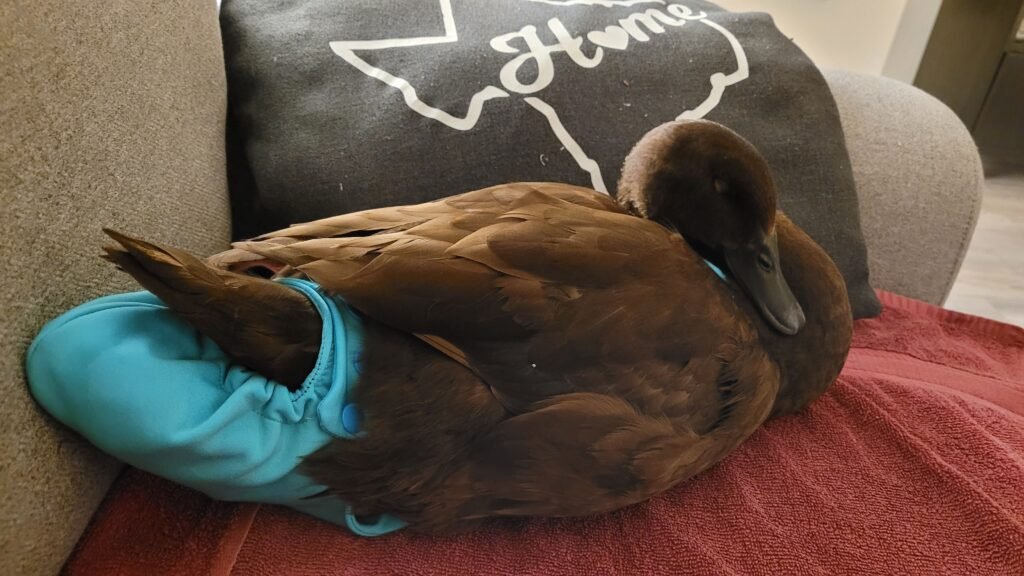
In my case, Krümel became more than a pet very early on. She seeks me out, sits with me quietly while I work, and seems to know when I need a moment of calm. I wasn’t looking for an emotional support animal, but I found one in her. Over time, my doctor recognized the deep emotional benefit Krümel provided and officially documented her as my ESA. That letter allows me to house her legally, even in situations that might otherwise restrict pets.
But it’s important to be realistic: ducks are not for everyone. Their emotional support is real, but they come with unique challenges. They require daily care, they’re messy, and they’re highly social—they should never be kept alone. So while ducks can absolutely meet the emotional needs of certain individuals, they’re not a one-size-fits-all ESA.
For the right person with the right setup, though, a duck can be an incredibly rewarding companion, and a truly soothing emotional anchor in difficult times.
The Legal Side: What the Law Says
Understanding the legal framework around emotional support animals is essential, especially when your companion is something less conventional, like a duck. Here’s a breakdown of the most relevant laws in the United States and what they mean for duck owners:
Fair Housing Act (FHA)
The FHA is the most important piece of legislation protecting your right to keep an emotional support animal, even in housing with a “no pets” policy.
Under the FHA, landlords are required to make reasonable accommodations for individuals with a disability who have an ESA. This includes waiving pet restrictions and pet fees. The law does not specify species, meaning that a duck can legally be kept as an ESA if you have proper documentation.
To qualify for protection:
- You must have a diagnosed emotional or mental health condition (such as anxiety, depression, PTSD, etc.)
- You must have a letter from a licensed healthcare provider stating that the ESA is necessary for your well-being
💡 Pro Tip: Landlords may request to see your ESA letter, but they cannot ask for specific details about your diagnosis or require your animal to be registered.
What About HOAs?
If you live in a neighborhood governed by a Homeowners Association (HOA), you might face rules that restrict poultry or classify ducks as farm animals. However, the Fair Housing Act (FHA) still applies.
This means:
- HOAs must consider reasonable accommodations for emotional support animals, even nontraditional ones like ducks, if you have a valid ESA letter from a licensed provider.
- They can request documentation, but they cannot deny your ESA solely based on species if the animal is not disruptive or dangerous.
- Be prepared to explain your duck’s role and show that they’re well cared for, quiet, and clean.
In my case, I have a formal letter from my physician confirming that Krümel is my ESA. This document ensures that I can legally keep her, even in housing situations where pets might not otherwise be allowed.
Air Carrier Access Act (ACAA)
Until early 2021, the ACAA required airlines to accommodate emotional support animals for in-cabin travel. However, as of a regulatory change issued by the U.S. Department of Transportation in December 2020, only trained service dogs are now guaranteed access to airplane cabins.
This means that:
- Ducks are no longer guaranteed airline access, even with ESA documentation
- Airlines are allowed (and most now do) treat ESAs as regular pets, subject to carrier restrictions and fees
- You may still be able to fly with your duck in the cargo hold or as a pet in-cabin on certain airlines, but you must check each airline’s policy in advance.
For me and Krümel, this meant carefully planning any travel. We’ve done road trips instead, where she rides safely in a large carrier and gets regular breaks. It takes more effort, but it’s doable—and far less stressful for both of us.
Americans with Disabilities Act (ADA)
The ADA provides protections for service animals in public spaces such as restaurants, stores, schools, and transportation systems. However, these protections only apply to dogs (and in some cases miniature horses) that are specifically trained to perform tasks related to a person’s disability.
Emotional support animals, including ducks, are not covered under the ADA. This means:
- Businesses and public facilities are not required to allow your ESA duck
- You cannot bring your duck into grocery stores, restaurants, or public buildings unless they have a pet-friendly policy or make an exception.
That said, some businesses may be flexible if you ask kindly and explain the situation, but this is at their discretion, not a legal right.
In Summary:
| Law | Applies to Ducks as ESAs? | What It Covers |
|---|---|---|
| Fair Housing Act (FHA) | ✅ Yes | Requires landlords to allow ESAs in housing |
| Air Carrier Access Act (ACAA) | ❌ Not anymore | Ducks are no longer guaranteed in-cabin access |
| Americans with Disabilities Act (ADA) | ❌ No | Ducks do not qualify as service animals under ADA |
Ducks can absolutely serve as emotional support animals under the law, but their rights are mostly limited to housing. With the right documentation, you’re protected at home. But for public access and travel, you’ll need to plan carefully and understand the current legal limitations.
Why Ducks Make Great Emotional Support Animals
While ducks may not be the first animals that come to mind when thinking about emotional support, they offer a unique kind of companionship that can be incredibly grounding and therapeutic. Their behavior, routines, and individual personalities make them well-suited to support people with mental health challenges, and research increasingly supports this.
Emotionally Intelligent and Socially Attuned
Birds, including ducks, have been shown to possess emotional sensitivity and social awareness. Studies on bird cognition reveal that certain species exhibit empathy-like behaviors, such as responding to distress in others. Ducks, as highly social animals, share many of these traits. They can recognize individual faces, respond to voices, and form meaningful attachments to people they trust.
Krümel, for instance, knows when something’s off. She’ll follow me more closely, gently quack in my direction, or nestle into my lap when I’m overwhelmed. It’s not anthropomorphism, it’s an observable, intuitive connection, and it’s backed by science.
✅ Scientific insight: A pilot clinical intervention using duck-assisted therapy in patients with traumatic brain injuries found that weekly interactions significantly reduced anxiety over a 12-week period (Purdue AAT study).
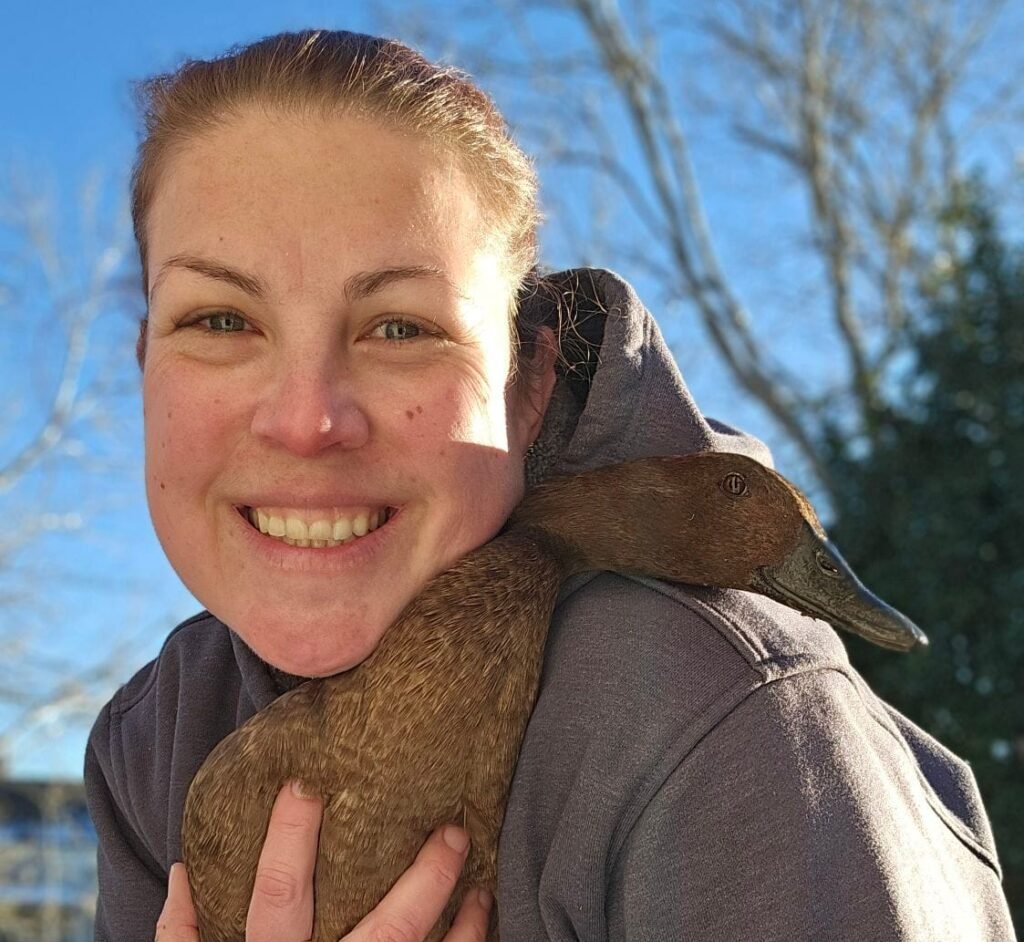
A Calming, Grounded Presence
There’s something inherently soothing about ducks. Their natural behaviors, preening, foraging, and swimming, are rhythmic and peaceful to watch. These small, predictable movements can have a calming effect, especially for individuals experiencing stress or emotional dysregulation.
✅ Research link: Animal-assisted therapy (AAT) in general has been shown to lower cortisol (stress hormone) and increase oxytocin (the bonding hormone), helping regulate mood and foster emotional well-being (Integrative Medicine Research).
Providing Structure and Purpose
Ducks need daily care: clean water, food, bathing space, and attention. This regular routine is a gift in disguise for people dealing with anxiety, depression, or PTSD. When your duck depends on you, it gives you a reason to get out of bed, go outside, and create structure in your day.
Having this sense of purpose, even in the smallest tasks like cleaning a pool or offering lettuce treats, can be transformative. It adds predictability and responsibility to your life—two things mental health practitioners often recommend for emotional stability.
Nonjudgmental, Unconditional Companionship
Ducks don’t care what kind of day you’re having. They don’t mind if you’re in pajamas, crying, or haven’t spoken a word in hours. They’ll still waddle over for a treat, snuggle into your lap, or gently nibble on your sleeve. This quiet, judgment-free companionship is often exactly what’s needed during challenging moments.
And this bond isn’t just anecdotal. Large-scale surveys confirm that pet owners frequently report emotional benefits from their animals, including feeling less anxious (62%), more emotionally supported (72%), and having more structure in their lives (29%) (APA Pets & Mental Health Report).
Tactile and Sensory Comfort
Soft feathers, gentle warmth, and the feeling of a duck preening your hair or nestling close can be powerfully soothing, especially for individuals with sensory processing challenges or those who benefit from physical grounding. Ducks engage our senses in a way that’s different from dogs or cats, but just as therapeutic.
Example from experience: When Krümel and I cuddle, it’s something truly special. Stroking her soft feathers, snuggling my face into her downy chest, and feeling her relax as I gently kiss her head brings a sense of calm and comfort that no other therapy can replicate. It’s in those quiet, shared moments that I feel most grounded.

Every Duck Has a Personality
Just like people, every duck is different. Some are bold and chatty; others are quiet and reserved. Some love to be held; others prefer to sit nearby. But when you’ve built a trusting relationship, that bond can become deeply meaningful.
Ducks like Krümel are living proof that emotional support doesn’t have to come from a dog or cat. It can come from a soft, feathered friend who recognizes your voice, knows your routines, and walks beside you, not because she has to, but because she chooses to.
Together, scientific studies and lived experience show that ducks are far more than quirky pets. They are sensitive, loyal, and remarkably supportive companions. And for some of us, they’re lifelines.
Things to Consider Before Choosing a Duck as an ESA
As wonderful and comforting as ducks can be, they’re not the right emotional support animal for everyone. Caring for a duck requires daily attention, time, and a long-term commitment. If you’re considering making your duck an ESA, or adopting one with that purpose in mind, here are some key factors to weigh first:
Daily Care and Cleanliness
Ducks are messy by nature. They poop frequently (every 15–30 minutes), splash water everywhere, and require constant access to clean drinking water and safe bathing areas. If you plan to keep your duck indoors, you’ll need to diaper them, clean them frequently, and set up a space that can handle water and mess.
Ducks are not low-maintenance animals, and emotional support should always be a mutual relationship. You support them just as they support you.
Ducks Are Social: Never Keep Just One
Ducks are flock animals and suffer deeply from loneliness. Even if your duck bonds closely with you, they still need duck companionship to thrive. An ESA duck should always live with at least one other duck to meet its social needs. Your emotional needs shouldn’t come at the expense of theirs.
If Krümel didn’t have the rest of our flock, I truly believe her mental well-being would suffer.
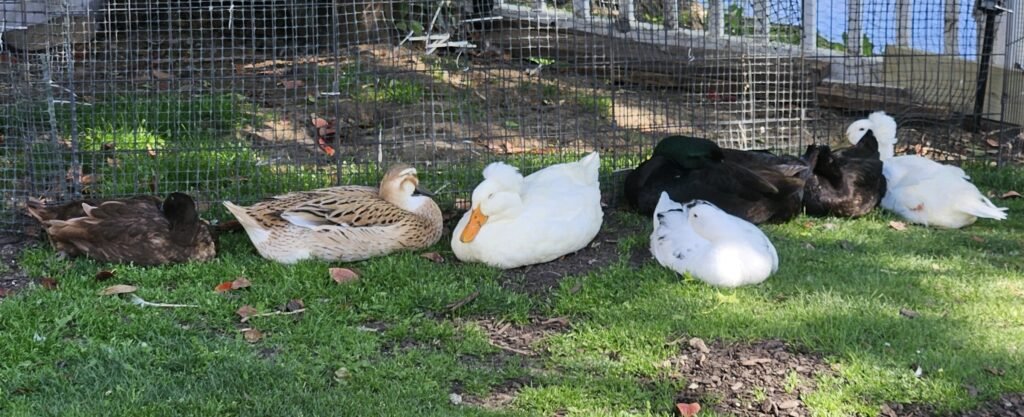
They Can Be Noisy
Even female ducks, who are usually louder than drakes, can produce quacks that carry. Depending on your housing situation (apartment, HOA community, shared walls), this could cause problems. Make sure your environment is duck-compatible or that you’re prepared to advocate for your ESA if noise becomes an issue.
Legal and Zoning Restrictions
Check your local city ordinances, county regulations, and HOA policies. Some places restrict backyard poultry or have noise and sanitation rules. While the Fair Housing Act can override pet bans for ESA ducks, you still need proper documentation, and the accommodation must be considered reasonable (i.e., not causing damage or public health concerns).
Limited Public Access
Remember, ducks are not considered service animals under the ADA. This means you cannot take them into public spaces like grocery stores, restaurants, or public transportation unless those businesses specifically allow animals. Don’t expect public access rights. Plan accordingly.
Travel Can Be Complicated
Airlines are no longer required to accept emotional support animals. If you’re traveling, your duck may need to stay home with a trusted caregiver, or you’ll need to road-trip like we do. I’ve taken Krümel on a multi-state journey, and while it was absolutely rewarding, it also required intense planning, hotel arrangements, and regular stops.

A Long-Term Commitment
Ducks can live 10–15 years with proper care. Becoming someone’s ESA is not a short-term fix—it’s a bond for life. If you’re considering getting a duck for emotional support, make sure you’re ready to meet their needs for the long haul.
The Bottom Line: Ducks can be incredible emotional companions, but they’re also living, feeling animals with specific needs. When given the proper environment and companionship, their ability to comfort and connect can be truly life-changing. But it’s essential to approach this decision with intention, research, and long-term responsibility in mind.
How to Register an ESA Duck (and Avoid Scams)
One of the most common misconceptions about emotional support animals is the idea that you need to “register” them in a national database or buy an official-looking ID badge. This has created a huge market for online ESA registries, and unfortunately, many of them are unnecessary at best and predatory at worst.
Let’s clarify what you actually need and how to avoid wasting money on meaningless certificates.
What You Really Need
To have a legally recognized emotional support animal, duck or otherwise, you only need one thing:
➡️ A valid ESA letter from a licensed mental health professional or physician.
This letter should:
- Be written on official letterhead
- Include the provider’s license number, credentials, and contact information
- State that you have a diagnosed emotional or mental health condition
- Confirm that the presence of an ESA is necessary for your emotional well-being
- Be signed and dated within the last year
That’s it. There’s no national registry, no official ID card, and no vest or certification required by law.
I have such a letter from my own physician confirming Krümel’s role as my ESA, and that document is what protects our rights under the Fair Housing Act.
Avoiding Scams: Red Flags to Watch For
Here are a few warning signs that you’re dealing with an ESA scam or a non-legitimate service:
- Claims that you need to register your ESA in a government database (none exists)
- Websites that offer instant ESA approval with no actual evaluation or provider interaction
- Offers to sell you a vest, badge, or certificate as a “legal requirement”
- Charges high fees just to generate a generic PDF letter
Legitimate ESA letters come from licensed professionals who are willing to evaluate your needs and support your mental health, not from automated websites offering overnight approvals.
💡 Pro Tip: Some telehealth services do offer ESA evaluations online, but be sure the provider is licensed in your state and that the letter meets FHA requirements. Always read reviews and verify credentials.
Keep It Private and Professional
You are not legally required to show anyone your diagnosis or detailed medical records. A proper ESA letter is all a landlord or HOA is allowed to request, and they cannot demand additional paperwork or charge you pet fees for your ESA.
Summary
- ✅ No registration required
- ✅ No vests, badges, or certificates necessary
- ✅ Just a legitimate ESA letter from a licensed provider
Avoid scams, protect your rights, and keep your focus where it belongs: on the bond between you and your duck, not on unnecessary paperwork.
Our Experience: How Krümel Supports Me
For me, having Krümel as my emotional support animal has made a profound difference in my daily life. She’s not just a duck, she’s a calming presence, a source of comfort, and an emotional anchor when the world feels overwhelming.
Krümel has a gentle and intuitive nature. She seems to know when I’m stressed, anxious, or mentally drained. During those moments, she stays close, often silently waddling over and settling beside me. When I stroke her soft feathers or bury my face into her warm down, I can feel my breathing slow, my muscles relax, and my thoughts settle. It’s not just emotional, it’s physical.
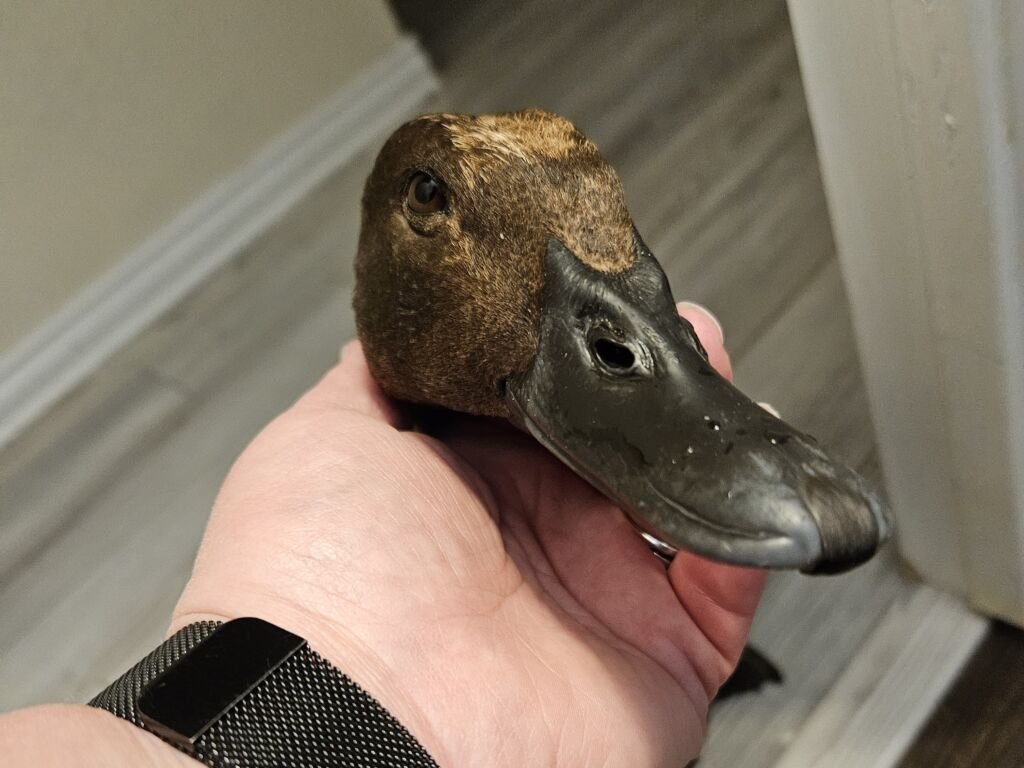
Caring for her provides a sense of routine that helps me stay grounded. No matter how busy or scattered my day gets, I know that Krümel needs me to show up: to clean her pool, refresh her water, feed her, and talk to her. And in return, she shows up for me every single day.
There have been times when I felt overwhelmed by personal or professional pressures, and just sitting with her, hearing her soft vocalizations or feeling the gentle weight of her body in my lap, brought me back to center. It’s in these quiet, mutual exchanges that I’m reminded how powerful nonverbal connection can be.
She doesn’t need to say anything. Her presence is enough.
Krümel has supported me through some of my hardest days. And while all my ducks bring joy and meaning to my life, Krümel is the one who grounds me when I need it most. She is calm when I am stormy. She is my reminder to pause, breathe, and simply be.
Final Thoughts
Ducks may not be the most common emotional support animals, but for those of us who share our lives with them, we know just how deeply comforting they can be. Their quiet routines, their soft feathers, and their strong bonds with their humans make them incredible companions, especially in times of emotional need.
Krümel has shown me that emotional support doesn’t have to come in the form of a wagging tail or a trained task. Sometimes, it’s the gentle presence of a duck who sits with you in silence, who grounds you when you’re spinning, and who reminds you to care, not just for them, but for yourself, too.
If you’re considering designating your duck as an ESA or bringing a duck into your life for emotional support, it’s important to do so thoughtfully. Make sure your setup is right, your commitment is long-term, and your intentions come from a place of love and understanding. Ducks require care, space, and socialization, but they give so much in return.
With the right environment and a meaningful bond, a duck can absolutely become a life-changing emotional companion.
Connect deeper with your flock. Discover more about duck psychology and social dynamics in the Community & Behavior Hub.
